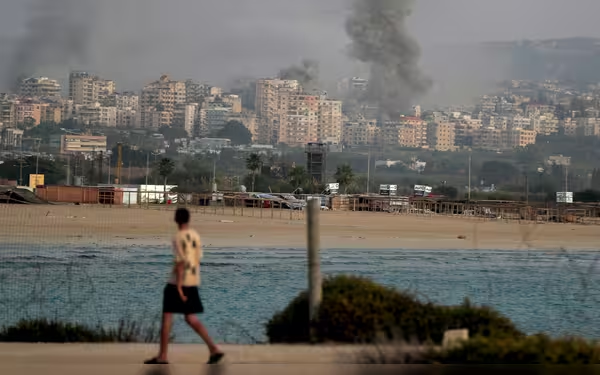Monday, December 23, 2024 01:43 AM
Israel Strikes Hezbollah in Beirut; Rockets Target Haifa
- Israel intensifies air strikes on Hezbollah strongholds.
- Hezbollah retaliates with rocket fire towards Haifa.
- Humanitarian crisis deepens amid escalating violence.
 Image Credits: arabnewspk
Image Credits: arabnewspkIsrael escalates military actions against Hezbollah in Beirut, while the humanitarian crisis worsens amid ongoing violence.
In recent days, the conflict between Israel and Hezbollah has escalated dramatically, with significant military actions taking place in southern Beirut and the surrounding regions. This surge in violence follows a series of events that began with Hamas's attack on Israel on October 7, 2023, which has since spiraled into a broader confrontation involving various militant groups supported by Iran. The situation has led to a humanitarian crisis, with thousands of casualties reported on both sides.
On Saturday, Israel conducted a series of air strikes targeting Hezbollah strongholds in Beirut and southern Lebanon. In response, Hezbollah claimed to have launched a barrage of rockets at several Israeli military bases near the coastal city of Haifa. Reports indicate that one of these strikes hit a synagogue, injuring two civilians. This exchange of fire marks a significant escalation in hostilities, as Israel has intensified its military operations in Lebanon since September 23, following a year of limited cross-border skirmishes.
Israeli military officials have stated that they will continue their operations until the safety of their citizens is assured, particularly those displaced from northern regions. Lt. Gen. Herzi Halevi emphasized that Israel is committed to conducting deep strikes against Hezbollah, which he claims has already suffered significant losses. Footage from AFPTV showed fresh air strikes on the southern suburbs of Beirut, prompting Israeli military calls for residents to evacuate.
In Lebanon, the situation remains dire. The Lebanese health ministry reported that an Israeli strike in the Bekaa Valley resulted in the deaths of six individuals, including three children. Additionally, funerals were held for 14 civil defense workers who lost their lives in a previous Israeli attack. The toll of the conflict has been staggering, with Lebanese authorities estimating over 3,452 deaths since October of last year, most of which have occurred in recent weeks.
As the violence continues, the humanitarian situation in Gaza is also worsening. The Gaza health ministry reported that the overall death toll has reached 43,799, with the majority being civilians. The ongoing conflict has led to a near-complete halt in food aid, raising concerns about famine in the region. Amid these dire circumstances, the international community is calling for a ceasefire and negotiations to address the humanitarian crisis.
In a broader context, the conflict has drawn in various militant groups, including Hamas and Islamic Jihad, all of which are backed by Iran. The geopolitical implications of this conflict are significant, as it not only affects the immediate region but also has the potential to escalate into a larger confrontation involving multiple nations. Diplomatic efforts to resolve the situation have been complicated, with recent proposals for a truce remaining unanswered by Israel.
As the situation unfolds, it is crucial for the international community to remain engaged and advocate for a peaceful resolution. The ongoing violence not only threatens the lives of countless individuals but also destabilizes the region further. A concerted effort towards dialogue and understanding is essential to prevent further loss of life and to pave the way for a lasting peace.













